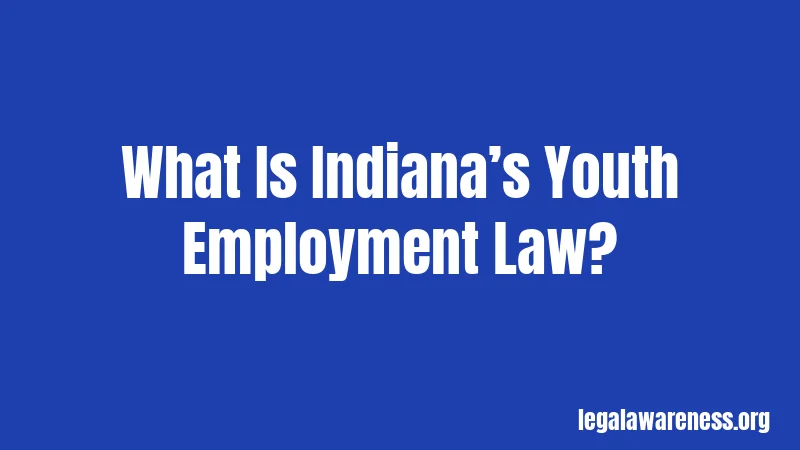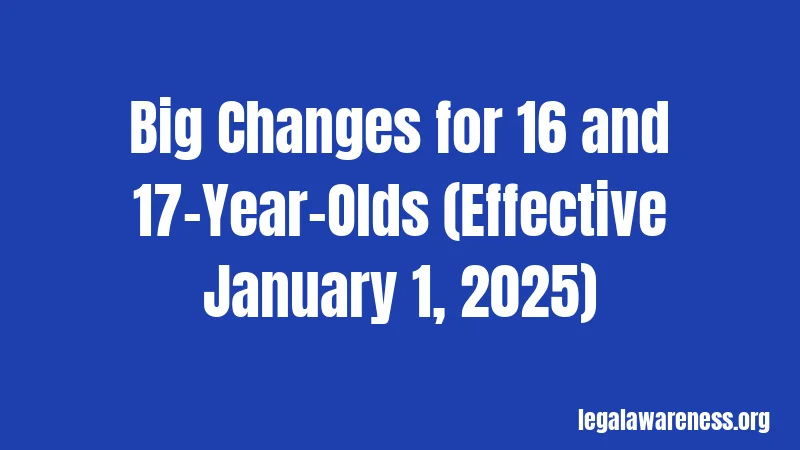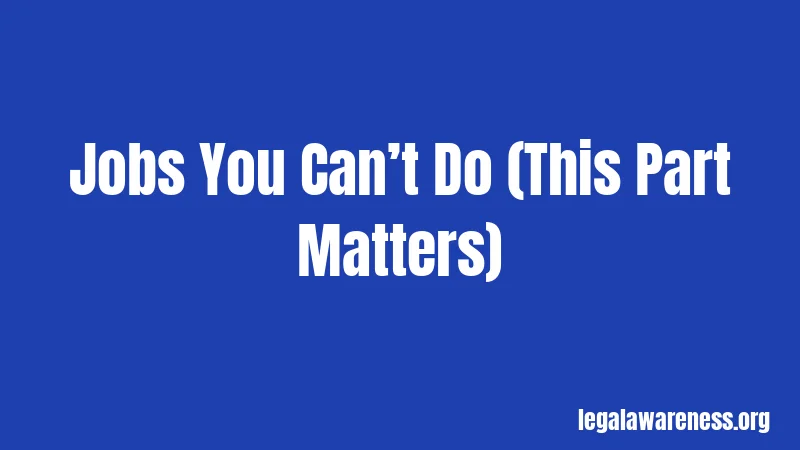Indiana Minor Labor Laws (2026): What Just Changed
Most young people have no idea things just got easier—or that these rules even exist. Seriously. But Indiana’s youth employment laws are strict, and they changed big time on January 1, 2025. If you’re a teenager looking to work, a parent helping your kid find a job, or an employer hiring young people, you need to know this stuff. Let me break it down in plain English.
Indiana wants to protect teens while letting them earn money and gain work experience. The state has rules about who can work, when they can work, and what jobs are off-limits. And some of these rules just got way more relaxed. Trust me, this one’s important.
What Is Indiana’s Youth Employment Law?

Indiana’s youth employment laws exist to keep minors safe at work. These rules protect young workers from dangerous jobs, long hours that interfere with school, and exploitation. The state also wants teens to keep their education on track while earning paychecks.
Think of it like guardrails. The laws don’t stop teens from working. They just make sure work happens in a reasonable, safe way. Pretty straightforward, right?
The Age You Can Actually Start Working
Here’s where it starts: Indiana requires workers to be at least 14 years old to get a regular job.
But wait, there are some exceptions. Younger kids can work in specific situations. Twelve and 13-year-olds can work as referees or umpires in youth sports. Younger kids can also deliver newspapers, perform in entertainment, or do work for their parents (but not hazardous stuff). But for regular jobs at stores, restaurants, and offices? You’ve gotta be 14.
If you’re under 14, don’t worry. You’ll get there soon. And honestly, waiting a couple years isn’t the worst thing.
Big Changes for 16 and 17-Year-Olds (Effective January 1, 2025)

Okay, pause. Read this carefully. This is actually huge.
Starting January 1, 2025, 16- and 17-year-olds can now work the same hours and days as adults. No restrictions. No parental permission needed. Nothing. Before this change, they were stuck with hour limits and couldn’t work past certain times. Now? They can work full-time schedules, nights, weekends—whatever.
This basically means older teens have way more freedom to earn money. You’re not alone if this surprises you—most employers don’t realize this changed yet. All previous hour and time restrictions for employment of minors 16 years and older have been repealed.
But here’s the catch: Prohibitions against hazardous occupations still apply. Even though you can work whenever, you still can’t work in dangerous jobs. We’ll get to that in a second.
Work Hours for 14 and 15-Year-Olds
Younger teens have stricter rules, and those didn’t change as much.
For minors who are 14 or 15, you can only work up to three hours on a school day, and up to eight hours on a non-school day. Over the course of a week, you can only work up to 18 hours per school week, and up to 40 hours during a non-school week.
Sound complicated? It’s actually not. Picture this: Monday through Friday during school months, your shifts are capped at 3 hours each. That’s basically a couple hours after school. On weekend days during school weeks, you can go up to 8 hours. Then during summer break when school’s out, everything opens up to 40 hours a week.
When can you work? 14- and 15-year-olds may only work from 7:00 am until 7:00 pm, and must work outside of school hours. So no 6 a.m. shifts before school starts. You’re not missing class for work.
But here’s where it gets better: From June 1st through Labor Day, minors are allowed to work until 9:00 pm. So during summer, you get an extra two hours at night.
Jobs You Can’t Do (This Part Matters)

Wondering if your job is even legal? Let me break down the no-go list.
Minors aged 14 and 15 have a much longer list of prohibited jobs than older teens. You cannot work in manufacturing, mining, or processing facilities. You can’t operate power-driven machinery, power tools, or equipment. Basically, if it’s loud, heavy, or dangerous, it’s off-limits.
Here’s what else you can’t do at 14 or 15: work in boiler or steam rooms, drive vehicles for work, prepare meat in processing plants, do roofing work, work with explosives, handle certain chemicals, or work in construction. The list is long because the state wants younger teens staying safe.
For 16 and 17-year-olds, the restrictions loosen up. You can do many of those jobs now. But you’re still blocked from working with explosives, doing wrecking or demolition work, working on roofs, operating certain dangerous machinery, and a few other hazardous tasks.
The rule is pretty simple: if a job could seriously hurt you, you probably can’t do it yet.
The New Registration System (YES)
Okay, this one’s just for employers, but you should know about it.
Indiana ditched the old work permit system completely. Effective July 1, 2021, Indiana eliminated work permits completely, and now requires all employers with five or more minor employees (under age 18) to use Indiana Department of Labor’s Youth Employment System (YES) to track and report minor-employee information.
So your boss probably has to register you in a system called YES. It’s electronic, it’s easy, and it keeps track of minor workers. Employers found to be out of compliance may receive fines of up to $400 per employee.
If your employer has fewer than 5 minor employees, they don’t have to register. But honestly, most places do anyway.
What does this mean for you? Nothing, really. You don’t need a work permit. You don’t need to go pick anything up from school. Your employer just registers your info electronically. Simple.
What About Breaks and Lunch?
Not sure what counts as a violation? Here’s a quick answer.
Indiana actually doesn’t require employers to give you breaks or lunch, no matter how long your shift is. As of April 1, 2020, the Indiana youth employment law removed the break/lunch requirement for minors. Employers are no longer required to provide a minor with a break or lunch regardless of the number of hours worked in a day.
Wait, that sounds bad. But here’s the thing: federal law still says that if you work 6 or more hours, you get breaks totaling 30 minutes. So even though state law doesn’t require them, federal law does. Your employer still has to follow that.
Yeah, this is confusing. But basically, don’t work an 8-hour shift without getting any break. That’s not legal under federal rules.
Penalties and What Happens If Rules Are Broken
Let’s talk about what happens when employers mess up.
If an employer violates youth employment laws, they get warnings first. During an initial inspection, any identified violations receive a warning letter. For subsequent inspections, the penalties escalate based on the number and nature of the violations, from a penalty of $50 up to $400.
Employers found to be out of compliance may receive fines of up to $400 per employee.
Here’s where it gets serious: each location of a business is treated separately. So if a chain restaurant has 20 locations and breaks the rules at 5 of them, that’s multiple violations stacking up fast. The fines add up quick.
Think of it like getting tickets. First time? You get a warning. Second time at a different location? Maybe a $50 fine. Keep breaking the rules? The fines jump to $100, $200, then $400.
What About Homeschooled Teens?
Confused about the difference for homeschool students? Let me break it down.
Students who are homeschooled or enrolled in an online school are considered the same as a minor who attends school in person. The school district calendar where the minor lives is used to determine beginning/end of school year, breaks, and holidays.
So if you’re homeschooled in Indianapolis, you follow the Indianapolis school district calendar. When they have summer break, you have summer break. When they’re in session, your work hours get capped at the school-day limits.
This is probably the most common question about the rules, and honestly, it makes total sense. Homeschool kids still need to balance work and education.
How to Know If Your Job Is Legal
Worried your job might break the rules? Here’s what to do.
First, check your age and the work hour limits above. Are you working within those limits? Good start.
Second, look at what you’re actually doing. If you’re operating machinery, working with chemicals, doing construction, or in any other job I mentioned in the “jobs you can’t do” section, that’s a red flag.
Third, if something feels sketchy, ask your employer. Indiana law charges the Indiana Bureau of Youth Employment with enforcing the prohibited and hazardous occupations. Your employer should know the rules.
If you really want to be sure, you can check with the Indiana Department of Labor directly. They have a full list of prohibited and hazardous jobs, broken down by age. It’s all online at www.in.gov/dol.
Special Rules You Should Know About
Hold on, there’s more. Indiana has some situations that don’t fit the normal rules.
Family-owned businesses work differently. The law exempts minors employed by their parents, legal guardians, or in family-owned businesses, as well as those in work-based learning courses, acting, newspaper delivery, and making evergreen wreaths.
So if you work for your parents, some of these rules don’t apply. But here’s the catch: even family businesses can’t make you do hazardous work. You can’t operate machinery for your dad’s construction company just because it’s family.
Work-based learning programs are also different. If you’re in a school program that teaches you actual job skills at a real workplace, you might have more flexibility with hours and tasks. Talk to your school counselor about this.
Contact Info and Resources
Need help? Here’s where to go.
The Indiana Department of Labor’s Youth Employment Division handles all these questions. You can reach them at (317) 232-2655 or email [email protected]. They’re seriously helpful and they answer questions from teens, parents, and employers constantly.
You can also check out www.in.gov/dol/youth-employment for official documents, forms, and detailed information about prohibited jobs and hour restrictions.
If you think your employer is breaking the law, you can file a complaint with the Department of Labor. They take these seriously and they investigate.
Frequently Asked Questions
Can I work before school starts in the morning?
No, not if you’re 14 or 15. You can’t start work before 7 a.m. on school days. Older teens can work whenever.
Do I get paid minimum wage?
Yes. Federal minimum wage applies in Indiana, which is currently $7.25 an hour. Your employer must pay you at least that much.
Can my employer ask me to work past the time limits?
Not if you’re 14 or 15. Those limits are hard rules, not suggestions. If you’re 16 or 17, your employer can ask you to work any hours they want (as long as it’s not a hazardous job).
What if I want to work more hours than allowed?
For 14 and 15-year-olds, you can’t. The law is the law. It protects you and your education. For 16 and 17-year-olds, there’s no limit anymore, so work as much as you want.
If I work six hours, do I have to get a break?
Yes. Even though Indiana doesn’t require it by state law, federal law does. You get breaks totaling at least 30 minutes on shifts of 6+ hours.
Final Thoughts
Indiana’s youth employment laws exist for a reason: to keep you safe, protect your education, and make sure you’re treated fairly at work. They changed in 2025 to give older teens more freedom while keeping 14 and 15-year-olds better protected.
If you’re getting a job, understand your work limits. If you’re hiring young people, know the rules and follow them. If something doesn’t seem right, reach out to the Indiana Department of Labor.
Stay informed, stay safe, and when in doubt, ask questions. You’ve got this.
References
Indiana Department of Labor: Youth Employment Home – https://www.in.gov/dol/youth-employment/youth-employment-home/
Indiana Department of Labor: Changes to Youth Employment Laws – https://www.in.gov/dol/youth-employment/youth-employment-home/changes-to-youth-employment-laws/
Indiana Department of Labor: Prohibited and Hazardous Occupations for Minors – https://www.in.gov/dol/youth-employment/prohibited-and-hazardous-occupations-for-minors/
Indiana Department of Labor: Teen Worker Safety – https://www.in.gov/dol/safety-and-health-consultation/teen-worker-safety/
Krieg DeVault LLP: What to Expect in 2025: Updates to Indiana Child Labor Laws – https://www.kriegdevault.com/insights/what-to-expect-in-2025-updates-to-indiana-child-labor-laws
